- Home
- Regan Walker
Racing with the Wind (Agents of the Crown) Page 4
Racing with the Wind (Agents of the Crown) Read online
Page 4
In the leather chair next to him, Griffen Lambeth crossed one foot over his knee and nursed his own drink. It was customary for the two to meet in Hugh’s London home to consider the business of the day before they went to a club for dinner, which tonight would be Brooks’s. The pair was supremely comfortable together and had been since they met at Eton. Though both did well at university, and both had been anxious to leave their days of formal education behind, Lambeth was the scholar.
As a second son, Griffen Lambeth had more freedom in his pursuits, and he had taken up writing historical accounts of European wars some years ago, but he’d found the effort disappointing. Since his return from France, Hugh had taken advantage of Lambeth’s boredom and urged him to join work of a different sort. His gift for strategy soon made him indispensible.
“I finally met Mary Campbell,” Hugh remarked, rising to add another log to the fire.
Lambeth raised an eyebrow. “You don’t say. When?”
“At Campbell Manor, near our country estate. Her uncle is Lord Baynes—Prinny’s favorite diplomat at the moment. He invited me there to discuss the current business in France, and she joined us for lunch.”
“What did you think of her?”
“She is…quite an interesting young woman.” Hugh conjured a picture in his mind of the smiling girl with golden hair and unusual green eyes talking about the black horse she loved.
Lambeth laughed. He switched his attention from the fire to his friend, his drink forgotten. “Define ‘interesting.’”
Hugh thought back to the big black stallion and Mary’s long legs wrapped around it. “Have you seen her ride?”
“No, but I’ve heard rumors she is a fierce horsewoman. And that her style is…well…unconventional.”
“Yes,” Hugh readily agreed. “I would say that it is. She is quite the free spirit on a horse, and she rides a magnificent black stallion, a Friesian. Few women could handle it.”
“A stallion?” Lambeth looked surprised. “That’s an odd choice for a lady’s mount, isn’t it? Even for her.”
“Because young women don’t ride stallions? This one does—and quite well.” Hugh pictured her once more, galloping free, raising her face to the sky, hair streaming behind her like golden fire. It was an image he would never forget. Then he frowned when he thought of the luncheon. “She is rather intelligent, but she has a strong will and a sharp tongue to go with it.”
Lambeth chuckled. “Well, old friend, I did warn you.”
Hugh nodded. Turning, he held up his brandy in mock toast, a wry smile on his face. “Yes, you did. And I intend to heed your warning and keep my distance.”
Chapter 4
Mary had been looking forward to the dinner at Elizabeth’s that evening; it would be an easy affair, one of the easiest engagements of her upcoming time in London. Viscount Rossington and his wife had been good friends of her parents and remained close to her mother after her father’s death. Mary had often spent time in their home visiting with Elizabeth and her three sisters, Caroline, Charlotte and Emma. Elizabeth was the youngest of the four girls, a petite beauty with copper-colored hair that reminded Mary of fall leaves. Mary teased Elizabeth that her blue-gray eyes always betrayed her emotions, but Mary valued Elizabeth’s rare gift of understanding people’s hearts, and it meant a great deal to her that Elizabeth in return admired her strength.
After dinner the two retired alone to the library, as was their custom. Neither of their mothers seemed to mind. In front of a warm fire, the girls shared their favorite drink, a ruby port. Though most young women found tea more appropriate, Mary and Elizabeth liked the taste of the rich red liquid, and a glass of port had a way of making their conversation more interesting.
Elizabeth spoke up suddenly. “Mary, remember the trees you used to climb at Campbell Manor?”
Mary sat indolently before the fire. “How can I forget? That was where the stable boys spent their time. I could not resist joining them.”
“I suppose it’s not surprising, then, that you eventually started dressing like them.”
“Now, Lizzy, even you must recognize how much easier it is to ride astride in breeches.”
Her friend set down her glass, a look of incredulity on her face. “Assuming you want to do that. You won’t find me on one of those beasts. I prefer the comforts of a carriage.”
“To me a carriage is merely a way of getting from one place to another when dressed up in finery. I prefer the freedom of riding astride. The feeling of being one with the horse, of racing with the w—”
“You are ever the adventurer, Mary, taking risks for the sheer joy of it. You were always getting us into one kind of trouble or another. I still shudder at the memory of that summer you led me on a tour through the bedchambers at Hatchland. I don’t think my parents ever got over it.”
Mary smiled. “Well, there wasn’t much else to do that summer if you’ll recall. I can only tolerate so many music lessons and so much embroidery. I can do the handwork, but it leaves my brain wanting. I didn’t even have Midnight then.”
“You were in your element with those tours,” Lizzy said. “I’ll not deny it.”
Mary thought back to that day so long ago when they were both still young girls. Mary, her mother and uncle and Elizabeth’s family had been invited for the day to Hatchland, the country home of Lord and Lady Chester. That afternoon, when the adults were viewing the sculptures in the great hall, Mary had stolen away with Elizabeth to the parts of the estate she found more interesting. She had led her friend into the master bedchamber, and there the two of them discovered, in a carved wooden armoire, furs and lace and a thin gossamer chemise. She’d been scandalized, for she had never considered the old countess would wear such attire.
Even more scandalous had been the sudden appearance of the earl’s valet striding into the bedchamber to discover them, the chemise dangling from Mary’s hand. Even though she maintained complete decorum, Mary had quickly been labeled as the instigator of the incident. What followed had been supremely unpleasant.
She shrugged. “Don’t remind me of that day, Lizzy. I might have been good at stealthy maneuvers, but not good enough.”
“I remember. I was mortified. You were punished for the episode.”
“I was,” Mary agreed. “An apology to Lord and Lady Chester, and I was confined to my bedchamber for a week. There were only so many books I could read! You were lucky they saw you as a mere follower. Of course, the sentence didn’t last as long as they’d hoped. I soon discovered I could climb out my window and down a tree next to the manor, a skill that has served me well on many later occasions.”
Lizzy shook her head. “You’re incorrigible, Mary. No wonder your mother gave up.”
“You’re making me feel guilty, Lizzy. But you’re right. I suppose she did give up trying to change me. It was easier to let me go my own way. And at least we are friends today.”
Mary took another sip of port and thought about the past. She’d been often in trouble as a young girl, but nothing ever came of it. She could never resist searching out new challenges, rules notwithstanding.
“I am thankful,” she announced to her friend, “that you were always willing to be dragged into my adventures.”
“Reluctantly,” Lizzy admitted. “I always worried where they might lead. Speaking of which, are you looking forward to Lady Huntingdon’s house party? That shall be an adventure.”
“I don’t know.” Mary hesitated. “I mean, I’ve never been to one, so this will be new and therefore possibly the adventure you envision, but it will also mean being with the same people for several days. What if I don’t like them? Worse, what if they don’t like me? Remember when—”
“Of course you will like them. And they will love you!”
Mary, who knew the rumors about her, just rolled her eyes; Baroness Johnson’s comment they’d overheard in the retiring room at the ball was not the only one made about her. She impersonated for Lizzy several stuffy old women
sipping tea and acting haughty, talking about that hellion in a gown.
Elizabeth stifled a laugh. “Do you know who is invited to the weekend?”
“Actually, no. I just assume it will be some of the earl’s friends—and an even number of marriageable men and women. That is the part I look forward to the least. I dislike being constantly on parade. I really wish you were going to be there.”
“I do as well,” Lizzy replied. “And it was kind of Lady Huntingdon to invite me, but as you know it is the same weekend as the christening for Charlotte’s little one. I simply have to attend! I will be anxious to hear about the weekend when you return, though. You must tell me everything. And don’t let that ancient incident with Ian McAllister set you off the young men of the ton who might want to be your suitors!”
“I’ll try, Lizzy, but even if I wanted to join in the ritual of the ton’s parties, how could any man truly find me attractive once he learns how little I care for the mores of the society I’d be asked to join?”
“Oh, they find you attractive,” Lizzy promised, “even with your independent reputation. Still, one day you will have to decide if you want a home and a family that a husband would bring. Not every day can be an adventure.”
Mary rose to stoke the fire, thinking about that. “Lizzy, have you ever met Hugh Redgrave, the Marquess of Ormond?”
Her friend pondered the question for a moment. “Lord Ormond? No, I haven’t met him, but I know the name. My sisters used to speak of him and his friend. I believe the friend’s name was…Lambeth? Yes. Griffen Lambeth. According to Caroline, they were among the most dashing men at her coming out. But they did not marry, and now they have reputations as rakes—which I assume does not bother them in the least. I recently heard my sisters saying Lord Ormond has taken up with the beautiful widow Lady Amanda Hearnshaw.”
“Isn’t she a horsewoman?” Mary thought she’d heard the name, as she always listened when anyone talked of women equestrians.
“I would not be the one to ask, Mary, but I cannot imagine any woman in England riding as well as you.”
“‘Taken up with,’” Mary repeated with a frown. “I presume she is his mistress. Men have so much more freedom than we do. Although, I wager Lady Hearnshaw is hoping for more.”
“That seems a risky way to catch a husband, if that’s what you’re implying.”
“Perhaps you have the right of it,” Mary allowed. “Still, I cannot imagine she would enter into such a relationship without hoping for marriage, for children, for more….”
“You would hope for more, Mary,” Lizzy said.
“Certainly I would.” Then, thinking about her own lonely childhood, she added, “I could love a man who didn’t stifle me. And I’d want a family…children with him. I’d want to care for them and—”
“Not all women want that. Besides, my sisters tell me some men of the peerage treat their mistresses better than their wives.”
Mary shook her head. “I’m in no hurry to have a man tell me what to do, married or not.” Unless I truly loved him and trusted him, for such a man would know my heart. “It seems we must endure so many rules while they must observe only a few. If a woman were to live her life as a rake does, she would be called something quite different, and it would not be flattering.”
“Nevertheless,” said Elizabeth, “being a rake has its consequences. Even now, I am sure the family of every girl coming out this season is wary of Ormond and his friend.”
Mary wondered if that were true. It did not seem to her that such men suffered overmuch. “Lord Ormond is a most handsome man, though he is also presumptuous and arrogant.” She found the latter unforgiveable, no matter that he would one day be a duke. Titles meant little compared to the man.
Elizabeth regarded her suspiciously from where she sat. “You met him, Mary?”
“Did I forget to say? He was visiting my uncle on business this morning and stayed for luncheon.”
“And? What did you think? You must tell me!”
“He has a presence about him,” she allowed. “And he’s very tall, with broad shoulders, long legs and dark wavy hair, the kind you want to run your fingers through. His eyes…it was as if they could see right through me. He was at the ball, too—the tall one dressed all in black, save for his shirt and neck cloth. Did you not see him?”
Elizabeth’s eyebrows rose. “I did see such a man. Wasn’t he the one next to the handsome blond?”
“I think he was standing next to a man with lighter hair. Do you think that was his friend, Lambeth?”
“It could have been. A very dashing man in a midnight blue coat,” Elizabeth went on. “I don’t remember much about the other except that he was tall. What else can you tell me about Lord Ormond?”
“He’s confident. Actually,” Mary admitted, “his confidence is rather overwhelming.”
Elizabeth raised a brow. “And what, pray tell, is that blush for?”
Mary shook her head. “I was remembering his smile. It was both annoying and rakishly charming. Of course, that was just before he took the conversation down a rabbit trail with some gossip about the Prince Regent he probably thought ladies should find interesting. I couldn’t have cared less. Still, I cannot forget him. I’ve never been both angry and intrigued at the same time.”
“I don’t suppose you are seeing him as yet another adventure?”
“Heavens no!” Mary protested, though she thought perhaps she should change the subject. “Tell me about his friend. Lambeth, you say? It must have been him in the blue coat.”
Elizabeth’s face lit up. “He is one of the Earl of Lindsey’s sons. I think you may have met him once. You mentioned it, I am certain.”
“Did I?” Mary said. “I do not recall the name, and I did not recognize him at the ball.” Of course, she was not too surprised. She often failed to remember men when introduced to them in a large group. Lizzy remembered everyone.
Her friend continued, “I know only what my sisters have said about him. Caroline danced with Lambeth several times in her first season, I think. Or perhaps it was Charlotte. Anyway, he was younger then and did not have the reputation he does today, but as I recall they spoke of him as kind and charming. Thoughtful as well.”
Mary considered. “We might see him at the next ball.”
A wide smile spread across Elizabeth’s face. “Well, then. That settles it. You must introduce me to Lord Ormond—and his friend, Mr. Lambeth.”
Mary’s gaze returned to the fire, and she took another sip of port. “Perhaps I could. But first there is the Huntingdon house party, and at some point I’m hoping to go to France again with my uncle.”
“Do you think he will take you?”
“I think he will, after what happened the last time. I believe he found me…useful. And he feels guilty for being away so much.”
Lizzy sighed. “You have a wonderful ally in Lord Baynes, Mary. I hope you do not take him for granted.”
Warmth flooded Mary when she thought of her uncle. “He’s a dear. I’m hoping to always be a part of his work, at least in some small way. Life can be so dull without adventures, and I want to do something important. Something significant.”
“But, Mary,” Lizzy realized suddenly, “if you go to France soon you’ll miss weeks of the season!”
Mary shrugged. “You know I really don’t care about that. The young men here are not interesting to me, and the older ones are more like my uncle: interesting but not attractive. At least, not attractive enough to make me want to marry one. Besides, I’m not ready to give up my freedom. I have begun to wonder if there ever could be a man for someone like me.”
“Of course there is, Mary. You just have to find him, no matter how long it takes.”
Lizzy was so understanding, so hopeful. Wanting to bring a smile to her friend’s face, Mary stood and raised her chin; then, in a voice of mock snobbery she announced, “Time and Mary Campbell wait for no man!”
The two girls broke into peals of laug
hter.
Once their mirth had run its course, Mary returned their conversation to her favorite subject. “In truth, I am so looking forward to seeing Paris again.”
Her friend’s countenance turned serious. “I have an odd feeling about you going this time, Mary. Some of your uncle’s work seems mysterious and…perhaps not for someone with your tendencies. I worry about you.”
Mary scoffed. This was yet another reason—besides discretion—she’d not told her friend all she had done in Paris to help her uncle on the last trip. She would not have Lizzy worry more. “You worry too much! About everything!”
“But sometimes I am right,” Elizabeth answered.
Chapter 5
The house party was an inevitable rite of passage for a young woman’s first season, Mary knew. If only Lizzy were joining her, she might have looked forward to the weekend, but as it was she traveled alone in her carriage, without even Milly, since the Huntingdon country estate lacked rooms for all the guests’ servants. Mary’s mother had offered one bright spot by revealing that Lady Huntingdon had acquired a French cook recently immigrated to London. It was gratifying to know the food would be good. French cooks were one of the benefits England had reaped from the tumultuous times in France.
It was a cold, gray afternoon as the carriage pulled up in front of the Huntingdon estate, but Mary was pleased she had arrived in time to change for the dinner that would be the first event in the weekend’s activities. Having spent much time in the damp carriage, she longed for a hot bath, a warm fire and some tea before she had to brave the other guests.
The front door opened as if the butler had anticipated her knock, and she entered the stately country mansion to find the earl and his wife waiting to greet her.
“I am so delighted you could come, Mary,” said Lady Huntingdon, a woman possessed of great elegance and of an age with her mother. She had soft brown hair and kind gray eyes, ageless in their appeal.

 Summer Warrior (The Clan Donald Saga Book 1)
Summer Warrior (The Clan Donald Saga Book 1) Echo in the Wind
Echo in the Wind Once Upon a Christmas Past
Once Upon a Christmas Past A Secret Scottish Christmas (Agents of the Crown Book 4)
A Secret Scottish Christmas (Agents of the Crown Book 4) The Holly and the Thistle
The Holly and the Thistle Racing with the Wind (Agents of the Crown)
Racing with the Wind (Agents of the Crown) Wind Raven (Agents of the Crown)
Wind Raven (Agents of the Crown) Rebel Warrior (Medieval Warriors #3)
Rebel Warrior (Medieval Warriors #3) King's Knight (Medieval Warriors Book 4)
King's Knight (Medieval Warriors Book 4)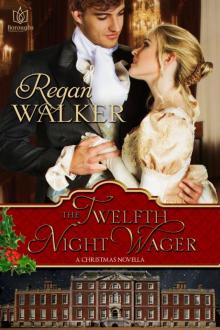 The Twelfth Night Wager
The Twelfth Night Wager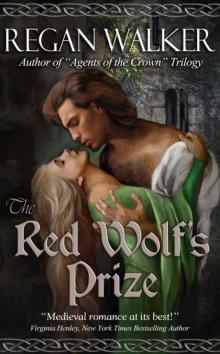 The Red Wolf's Prize
The Red Wolf's Prize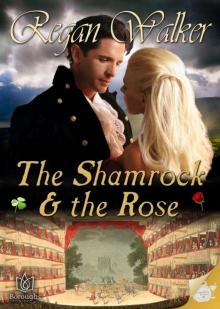 The Shamrock & the Rose
The Shamrock & the Rose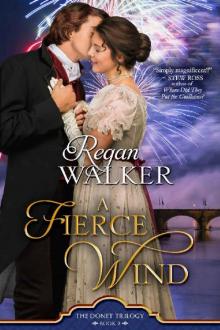 A Fierce Wind (Donet Trilogy Book 3)
A Fierce Wind (Donet Trilogy Book 3)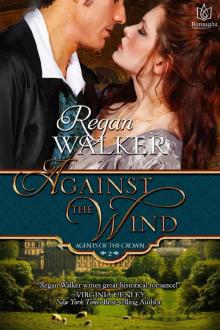 Against the Wind (Agents of the Crown Book 2)
Against the Wind (Agents of the Crown Book 2)